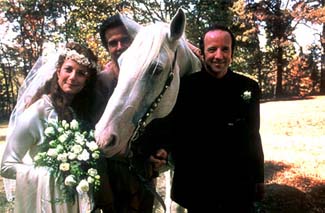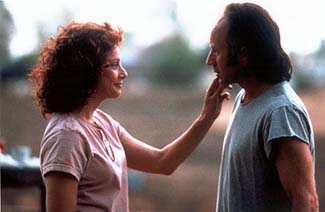|
There’s a scene halfway
through Big Bad Love where Leon Barlow (Arliss
Howard) sits—wrapped in a bedsheet—on his farmhouse’s
front porch sipping a cup of coffee as the sun dawns on
a new day. Seems idyllic doesn’t it? It is if you
haven’t seen the first hour of the film. Leon is
an unemployed, unpublished writer, and he’s just
capped off a rip-roaring weekend bender. So, what’s
great about this porch scene? Nothing, actually. But,
it’s the first time—of many—where I thought:
"It sure doesn’t look bad to be a struggling writer
in Mississippi."
The movie is adapted from
a collection of short stories (Big Bad Love) written
by Larry Brown. The old adage, write what you know applies
for Brown; both he and his fictional offspring hail from
Mississippi; both served in the Armed Service; both struggled
before making their literary name. To Howard’s credit
the nuances of southern-writer seem dead on accurate.
By nuances I mean Howard’s drawl, his spitfire temper
but laid back approach. However, the first crack in the
film’s authenticity is Howard’s physique. Writers
don’t have bodies like flyweight boxers.
Barlow is an alcoholic—typical
of nearly every writer portrayed on the screen—and
his Mississippi life is a living nightmare. His best friend
is a millionaire rabble-rouser, Monroe (Paul Le Mat),
who he peruses the local haunts with before passing out
in his single bed, or in a few instances, his bathtub.
His relationship with his ex-wife is strained. He has
two kids; the youngest, the daughter, has a medical condition.
He and Monroe paint houses for income. He churns out the
pages by the dozen but his mailbox is stuffed, daily,
with rejections.
 |
Almost all of Barlow’s
pain comes from his divorce. Although, aside from a flashback,
where the 8mm movie of his wedding day runs backwards—we
are given nothing of his relationship with Marilyn (Debra
Winger). Barlow has the capacity for passion/feeling but
there’s a disconnect between his heart and soul.
In the attempt to fuse them (and his marriage) back together,
he escapes into his fertile imagination, which intensifies
his pain, thus he hoses down the whole mess with beer.
Unfortunately, instead
of portraying Barlow with a stifling, if not debilitating
exterior life—Howard (as director) has chosen to
glamorize the writing life by relying on and exploiting
every known writer cliché. This happens in most
movies featuring the protagonist as a writer. Yes, there
are many writer movies out there. To name just a few:
John Mahoney’s WP in Barton Fink (who is purposely
a stereotype—those clever Coen Bros.), Patrick Dempsey’s
lead character in Happy Together, Mickey Rourke
in Barfly, and more recently, Colin Hanks' character
in Orange County. Granted, the two teen movies
avoid the alcoholism trope, still both are unable to balance
their inner-selves with the exterior world.
 |
Has the writer-protagonist
become a stock character for any/all movies wanting to
portray an artist out of touch with their sensibilities?
Show the audience a writer and automatically they see:
1. Searcher 2. Untapped passion 3. Pain, and thus by stereotype
baggage alone the director is excused from spending twenty
minutes of a film’s precious 145 setting up the protagonist’s
plight. Barlow, of course, is all of the above: searcher;
fighter (with persistence greater than Phillip Marlow
and a body like Sugar Ray Leonard). He’s up to his
neck with extraordinary pain (divorced, rejected, sick
kid)—but the movie skips across the surface of these,
using them only as touchstones of Barlow’s miserable
life.
PAIN+IMAGINATION+BEER=MORE
PAIN/BAD LIFE is the equation Big Bad Love tries
so valiantly to portray, but mong all the drinking, carousing,
bathtub passing out, failing family relationships, irresponsibility,
sick child, unemployment—all of which is played over
a sound track by R.L. Burnside and Tom Waits—what
we see best is Barlow’s fertile imagination. This
is the one innovative and wonderful success of the film.
Jay Rabinowitz’s (Homicide: Life on the Street,
Requiem for a Dream")
dexterous editing stitches together Leon’s internal
vision like a bizarre-surreal-magical-realism hootenanny
of clown masks, railroad cars, water filled houses, and
‘Nam flashbacks. It saves the film from being trite
writer escaping his demons to writer escaping his demons
with MTVesque editing.
The acting nearly saves
the film, too. Debra Winger, Patricia Arquette, and Paul
Le Man are all very good at rounding out Howard’s
world. But it’s not enough.
In the end, Big Bad
Love romanticizes what would otherwise seem an ugly
and horrid life. I have the suspicion that I was suppose
to feel, and maybe even shed a tear, as I watched Barlow
struggle with his pain, waiting for his break. It made
me, instead, want to move to Mississippi—the writing
life down there doesn’t seem too bad.
|